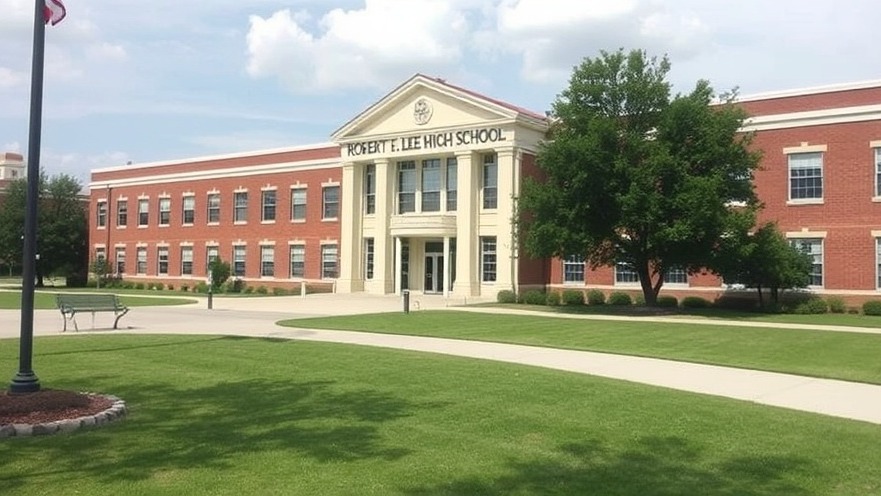
Controversy Brews Over High School Name Change in Texas
In Midland, Texas, a significant controversy is brewing over the potential renaming of a local high school back to its former Confederate moniker, Lee High School. After shedding the name of Confederate General Robert E. Lee in 2020 to become Legacy High School—a decision made amidst a nationwide push to distill institutions from the Confederacy—this reversal reflects a larger cultural clash in America today, particularly in Southern states.
A Shift in Local Leadership and Conversations
Following the aftermath of social justice movements and the shifting sentiments in political leadership, the Midland Independent School District finds itself at a crossroads. Newly elected board members are rekindling discussions surrounding the school's name, with Vice President Josh Guinn expressing a preference to revert to the Lee moniker as a representation of community pride rather than an endorsement of its historical figures. Guinn’s view underscores the ongoing strife concerning patriotic identity versus the dual recognition of historical context, positioning Lee not as a symbol of division but one of unity for the Midland community.
The Ripple Effects of Historical Context
Amidst these discussions, the historical relevance of Robert E. Lee remains contentious. On one hand, proponents argue that restoring Lee’s name honors local athletic achievements and the collective history of past students; on the other, opponents fear a return to a narrative that excludes and marginalizes communities of color. As cities across Texas and beyond reconsider connections to the Confederacy, Midland’s decision could signal a broader acceptance of what many view as a regressive stance to override educational initiatives aimed at inclusion.
National Trends: Honoring the Confederacy vs. Reimagining Legacy
The Midland situation echoes a national dialogue regarding remnants of Confederate symbolism. With notable instances, such as President Trump’s push to revert military base names back to those honoring Confederate figures, individuals in Midland may find themselves grappling with similar queries. The debate over renaming schools serves as a reflection of national sentiment, particularly in a state that boasts integration within Confederate nomenclature at nearly 40 schools. As liberal attitudes champion a progressive shift, conservative perspectives often cling to historical pride.
The Impact on Students and Community Perception
The implications of this debate stretch far beyond the school board room. La'Toya Mayberry, a local mother and advocate for the renaming initiatives, articulates concern for how current students perceive these changes. Her daughters, who excel not just academically but also athletically, represent her stake in their educational environment—one that ideally should embody values of inclusivity rather than exclusion. “What does this say to her that you want to restore a name that meant whites only?” Mayberry asks, punctuating the dilemma at hand.
Future Implications and the Call for Dialogue
As the Midland School Board prepares to make decisions regarding the school's future identity, the ramifications of their choice extend beyond local corridors. Stakeholders argue this represents a pivotal moment to engage with community perspectives and encourage fruitful discourse. While the name change may seem highly symbolic, it serves as a lens through which the entire community can examine its values—whether rooted in heritage or inclusivity. Engaging youth, educators, and families in this conversation, as echoed in Mayberry’s calls for awareness, could lead to transformative action, providing real-time responses to challenging societal shifts.
Conclusion: Making School Identity Relevant to All
The ongoing actions regarding Midland's Legacy High School epitomize the crux of identity, history, and community engagement across parts of Texas today. As conversations continue evolving, it remains imperative for local authorities to prioritize and respect diverse narratives while formulating decisions that consider all segments of their communities. It is through understanding and dialogue that Texas, particularly communities like Midland, can truly reflect on the legacies they choose to uphold, ensuring that future generations feel represented and included. This is a moment where we can all reflect critically on our school's identity and its significance not only in our homes but throughout our diverse state.
 Add Element
Add Element  Add Row
Add Row 



Write A Comment